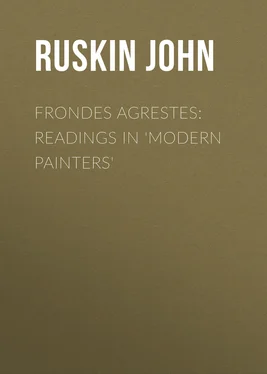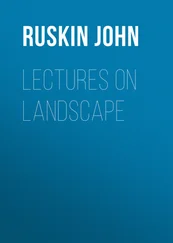John Ruskin - Frondes Agrestes - Readings in 'Modern Painters'
Здесь есть возможность читать онлайн «John Ruskin - Frondes Agrestes - Readings in 'Modern Painters'» — ознакомительный отрывок электронной книги совершенно бесплатно, а после прочтения отрывка купить полную версию. В некоторых случаях можно слушать аудио, скачать через торрент в формате fb2 и присутствует краткое содержание. Издательство: Иностранный паблик, Жанр: foreign_antique, foreign_home, literature_19, visual_arts, на английском языке. Описание произведения, (предисловие) а так же отзывы посетителей доступны на портале библиотеки ЛибКат.
- Название:Frondes Agrestes: Readings in 'Modern Painters'
- Автор:
- Издательство:Иностранный паблик
- Жанр:
- Год:неизвестен
- ISBN:нет данных
- Рейтинг книги:5 / 5. Голосов: 1
-
Избранное:Добавить в избранное
- Отзывы:
-
Ваша оценка:
- 100
- 1
- 2
- 3
- 4
- 5
Frondes Agrestes: Readings in 'Modern Painters': краткое содержание, описание и аннотация
Предлагаем к чтению аннотацию, описание, краткое содержание или предисловие (зависит от того, что написал сам автор книги «Frondes Agrestes: Readings in 'Modern Painters'»). Если вы не нашли необходимую информацию о книге — напишите в комментариях, мы постараемся отыскать её.
Frondes Agrestes: Readings in 'Modern Painters' — читать онлайн ознакомительный отрывок
Ниже представлен текст книги, разбитый по страницам. Система сохранения места последней прочитанной страницы, позволяет с удобством читать онлайн бесплатно книгу «Frondes Agrestes: Readings in 'Modern Painters'», без необходимости каждый раз заново искать на чём Вы остановились. Поставьте закладку, и сможете в любой момент перейти на страницу, на которой закончили чтение.
Интервал:
Закладка:
19 12 12 This, and the following passage, have nothing to do with the general statements in the book. They occur with reference only to my own idiosyncrasy. I was much surprised when I found first how individual it was, by a Pre-Raphaelite painter's declaring a piece of unwholesome reedy fen to be more beautiful than Benvenue.
. Although there are few districts of Northern Europe, however apparently dull or tame, in which I cannot find pleasure; though the whole of Northern France (except Champagne), dull as it seems to most travellers, is to me a perpetual paradise; and, putting Lincolnshire, Leicestershire, and one or two such other perfectly flat districts aside, there is not an English county which I should not find entertainment in exploring the cross-roads of, foot by foot,—yet all my best enjoyment would be owing to the imagination of the hills, colouring with their far-away memories every lowland stone and herb. The pleasant French coteau, green in the sunshine, delights me either by what real mountain character it has in itself, (for in extent and succession of promontory, the flanks of the French valleys have quite the sublimity of true mountain distances,) or by its broken ground and rugged steps among the vines, and rise of the leafage above against the blue sky, as it might rise at Vevay or Como. There is not a wave of the Seine, but is associated in my mind with the first rise of the sandstones and forest pines of Fontainebleau; and with the hope of the Alps, as one leaves Paris, with the horses' heads to the southwest, the morning sun flashing on the bright waves at Charenton. If there be no hope or association of this kind, and if I cannot deceive myself into fancying that perhaps at the next rise of the road there may be the film of a blue hill in the gleam of sky at the horizon, the landscape, however beautiful, produces in me even a kind of sickness and pain; and the whole view from Richmond Hill or Windsor Terrace,—nay, the gardens of Alcinous, with their perpetual summer—or of the Hesperides, (if they were flat, and not close to Atlas,) golden apples and all, I would give away in an instant, for one mossy granite stone a foot broad, and two leaves of lady fern.
20. I cannot find words to express the intense pleasure I have always in first finding myself, after some prolonged stay in England, at the foot of the old tower of Calais Church. The large neglect, the noble unsightliness of it; the record of its years written so visibly, yet without sign of weakness or decay; its stern wasteness and gloom, eaten away by the Channel winds, and overgrown with the bitter sea grasses; its slates and tiles all shaken and rent, and yet not falling; its desert of brickwork, full of bolts, and holes, and ugly fissures, and yet strong, like a bare brown rock; its carelessness of what any one thinks or feels about it, putting forth no claim, having no beauty, nor desirableness, pride, nor grace; yet neither asking for pity; not, as ruins are, useless and piteous, feebly or fondly garrulous of better days; but, useful still, going through its own daily work,—as some old fisherman, beaten grey by storm, yet drawing his daily nets: so it stands, with no complaint about its past youth, in blanched and meagre massiveness and serviceableness, gathering human souls together underneath it; the sound of its bells for prayer still rolling through its rents; and the grey peak of it seen far across the sea, principal of the three that rise above the waste of surfy sand and hillocked shore,—the lighthouse for life, and the belfry for labour, and this—for patience and praise.
I cannot tell the half of the strange pleasures and thoughts that come about me at the sight of that old tower; for, in some sort, it is the epitome of all that makes the continent of Europe interesting, as opposed to new countries; and, above all, it completely expresses that agedness in the midst of active life which binds the old and the new into harmony. We in England have our new streets, our new inn, our green shaven lawn, and our piece of ruin emergent from it—a mere specimen of the Middle Ages put on a bit of velvet carpet, to be shown; and which, but for its size, might as well be on a museum shelf at once, under cover;—but, on the Continent, the links are unbroken between the past and present; and, in such use as they can serve for, the grey-headed wrecks are suffered to stay with men; while, in unbroken line, the generations of spared buildings are seen succeeding, each in its place. And thus, in its largeness, in its permitted evidence of slow decline, in its poverty, in its absence of all pretence, of all show and care for outside aspect, that Calais tower has an infinite of symbolism in it, all the more striking because usually seen in contrast with English scenes expressive of feelings the exact reverse of these 13 13 My friend won't write out the reverse! Our book is to be all jelly, and no powder, it seems. Well, I'm very thankful she likes the jelly,—at any rate, it makes me sure that it is well made.
.
SECTION III.
ILLUSTRATIVE: THE SKY
21. It is a strange thing how little in general people know about the sky. It is the part of creation in which Nature has done more for the sake of pleasing man—more for the sole and evident purpose of talking to him, and teaching him—than in any other of her works; and it is just the part in which we least attend to her. There are not many of her other works in which some more material or essential purpose than the mere pleasing of man is not answered by every part of their organization; but every essential purpose of the sky might, so far as we know, be answered if once in three days, or thereabouts, a great, ugly, black rain-cloud were brought up over the blue, and everything well watered, and so all left blue again till next time, with perhaps a film of morning and evening mist for dew;—and instead of this, there is not a moment of any day of our lives, when Nature is not producing scene after scene, picture after picture, glory after glory, and working still upon such exquisite and constant principles of the most perfect beauty, that it is quite certain 14 14 At least, I thought so, when I was four-and-twenty. At five-and-fifty, I fancy that it is just possible there may be other creatures in the universe to be pleased, or,—it may be,—displeased, by the weather.
it is all done for us, and intended for our perpetual pleasure. And every man, wherever placed, however far from other sources of interest or of beauty, has this doing for him constantly. The noblest scenes of the earth can be seen and known but by few; it is not intended that man should live always in the midst of them; he injures them by his presence, he ceases to feel them if he is always with them; but the sky is for all: bright as it is, it is not
"too bright nor good For human nature's daily food;"
it is fitted in all its functions for the perpetual comfort and exalting of the heart,—for soothing it, and purifying it from its dross and dust. Sometimes gentle, sometimes capricious, sometimes awful—never the same for two moments together; almost human in its passions, almost spiritual in its tenderness, almost divine in its infinity, its appeal to what is immortal in us is as distinct as its ministry of chastisement or of blessing to what is mortal is essential. And yet we never attend to it, we never make it a subject of thought, but as it has to do with our animal sensations; we look upon all by which it speaks to us more clearly than to brutes, upon all which bears witness to the intentions of the Supreme that we are to receive more from the covering vault than the light and the dew which we share with the weed and the worm, as only a succession of meaningless and monotonous accident, too common and too vain to be worthy of a moment of watchfulness, or a glance of admiration. If in our moments of utter idleness and insipidity, we turn to the sky as a last resource, which of its phenomena do we speak of? One says, it has been wet; and another, it has been windy; and another, it has been warm. Who among the whole chattering crowd can tell one of the forms and the precipices of the chain of tall white mountains that girded the horizon at noon yesterday? Who saw the narrow sunbeam that came out of the south, and smote upon their summits until they melted and mouldered away in a dust of blue rain? Who saw the dance of the dead clouds when the sunlight left them last night, and the west wind blew them before it like withered leaves? All has passed unregretted as unseen; or, if the apathy be ever shaken off even for an instant, it is only by what is gross, or what is extraordinary. And yet it is not in the broad and fierce manifestations of the elemental energies, not in the clash of the hail, nor the drift of the whirlwind, that the highest characters of the sublime are developed. God is not in the earthquake, nor in the fire, but in the still, small voice. They are but the blunt and the low faculties of our nature, which can only be addressed through lamp-black and lightning. It is in quiet and subdued passages of unobtrusive majesty, the deep and the calm, and the perpetual; that which must be sought ere it is seen, and loved ere it is understood; things which the angels work out for us daily, and yet vary eternally; which are never wanting, and never repeated; which are to be found always, yet each found but once;—it is through these that the lesson of devotion is chiefly taught, and the blessing of beauty given.
Читать дальшеИнтервал:
Закладка:
Похожие книги на «Frondes Agrestes: Readings in 'Modern Painters'»
Представляем Вашему вниманию похожие книги на «Frondes Agrestes: Readings in 'Modern Painters'» списком для выбора. Мы отобрали схожую по названию и смыслу литературу в надежде предоставить читателям больше вариантов отыскать новые, интересные, ещё непрочитанные произведения.
Обсуждение, отзывы о книге «Frondes Agrestes: Readings in 'Modern Painters'» и просто собственные мнения читателей. Оставьте ваши комментарии, напишите, что Вы думаете о произведении, его смысле или главных героях. Укажите что конкретно понравилось, а что нет, и почему Вы так считаете.



![John Ruskin - Stones of Venice [introductions]](/books/732383/john-ruskin-stones-of-venice-introductions-thumb.webp)








